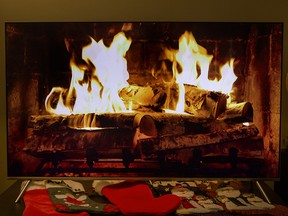The first fireplace program was inspired in 1966 by a roaring fire burning in the background of a Coca-Cola commercial
Article content
A 17-second film clip shot nearly six decades ago sparked a new way to appreciate one of the simplest human comforts — fire. The televised fireplace has gone on to become an unlikely ratings monster.
Article content
Article content
“You don’t get the heat thrown out at you. But that’s OK, too. We’re all warm enough anyways,” said Bill Morari, general manager of the National Club, a private members’ club located on Bay Street in Toronto’s financial district.
Advertisement 2
Article content
The club has eight real working fireplaces. But it also tunes in to fireplace TV, the fire offering crackling coziness without need for attention, replenishment or clean-up.
Variations on the fiery theme can be seen increasingly in restaurants, bars and any home in need of a touch of warmth, often replacing the 24-hour cable news channel that used to be the default. It’s a hit.
Business Insider reported that Fireplace for Your Home: Classic Edition and Fireplace for Your Home: Birchwood Edition were No. 2 and No. 4 on Netflix’s top 10 list in the last week of 2023, “destroying the new Trevor Noah special, ‘Young Sheldon,’ and ‘The Crown’ in the charts.”
“This year, our customers across the country have already viewed the Fireplace Channel for approximately five million hours, with viewership growing each day leading up to the holidays,” said Zac Carreiro, who speaks for Rogers, the Canadian cable behemoth whose 2.7 million TV subscribers often choose the cozy fire over the other 115 channels in its most popular TV package.
The fireplace channel “now airs 24-7 throughout the year with a significant spike in viewership in December,” Carreiro said.
Advertisement 3
Article content
Recommended from Editorial
Morari said the National Club dims the lights, lights a few candles, turns on the virtual fire and suddenly, the club is selling more cognac.
“The world, at times, can be a mess and you come to a place like The National Club to escape some of that,” Morari said. “I’ve had people say I don’t want CP24. But I’ve never had anybody say, ‘Hey, get the fire log off the TV.’”
Fred Thrower, then general manager of New York City’s WPIX, was inspired by a roaring fire in the background of a Coca-Cola commercial to create the first TV fire in 1966. He filmed the television station’s Yule Log program in the city-that-doesn’t-sleep’s official mayor’s residence, Gracie Mansion.
The televised loop of a cheery blaze with hanging stockings and piles of presents was aimed at pleasing apartment dwellers who had no fireplace of their own, his son said in a recent interview.
“We’d drive to commute into the city together,” said Mitch Thrower, whose father passed away in 1999.
Advertisement 4
Article content
“He would look at all the apartment buildings and was just so happy that he was able to give them a fire because so many people don’t have a fireplace.”
Fred Thrower laid out his idea to “fill a hole in the college basketball schedule” on Christmas Eve with “something different and special” in a Nov. 2, 1966, memo to WPIX staffers.
He cancelled all programming from 10 p.m. until midnight and replaced it with a loop of the Gracie Mansion fireplace.
“The color picture would open on a beautiful fireplace with Christmas stocking and flaming yule logs and the camera would dolly in eyeball to eyeball with the fire so that the effect is that the television set becomes a fireplace,” Fred Thrower wrote in his now famous memo.
“They kicked roller derby off the air, and they put the yule log on and, boy, it definitely changed the world,” Thrower’s son, Mitch said.
“It’s striking simplicity was its fundamental power.”
The idea — since copied around the world — involves gathering around a shared experience, he said. “You would see this fire burning and know that there was someone maybe nearby that was watching the exact same thing.”
Advertisement 5
Article content
The original was replaced in 1970 with a six-minute loop shot in Palo Alto, Calif., he said, noting his father’s idea was the genesis for the slow TV movement sweeping Nordic countries with programs that depict “12 hours of riding a train, or the clouds or a waterfall…. Visual soundscapes were born from the yule log.”
The original yule log and its descendants aired for more than two decades — even making a surprising comeback in 2001. “People wanted it back after 9/11 to warm up the city and to bring people back to tradition,” said Mitch Thrower.
It’s been a workhorse for the station.
“The tradition of the telecast of the Yule Log on Christmas morning on WPIX in New York has stood the test of time, with hundreds of thousands of viewers per year,” said Sarah Muratore, director of communications for the ratings agency Nielsen. “Even with streaming services offering alternatives, the most recent holiday version had 150,000 viewers.”
Netflix has found millions for its fire.
Director George Ford made about 200 attempts over two years to get his first Netflix fireplace just right.
Advertisement 6
Article content
“It’s really hard to film a fire,” Ford said in a recent interview.
“The wood that I used for the classic fireplace that’s very popular is Canadian fir…. It’s a heartier wood that burns a little longer.”
Among his other many titles, Ford directed the two Fireplace for Your Home episodes that toasted the competition on Netflix last Christmas.
He draws inspiration from a childhood spent in a house outside Spokane, Wash., that was built in 1892.
“The centre of the house had this furnace in the basement, and we burned wood for our primary heat,” Ford said. “Growing up, it was stoke the furnace — my dad taught me at a young age … how to go down in the basement and put the best wood on the fire and make it last a long time.”
At Christmas, the National Club’s Morari also tunes in to fireplace television at home, on a TV positioned above a real fire because his dog likes to curl up in front of the flames.
Getting a real blaze going can be “a pain in the butt,” Morari said.
“I know people that will have the fire log (on a TV screen) rather than having to put wood in and keep it going, and add more logs, then clean it up.”
Our website is the place for the latest breaking news, exclusive scoops, longreads and provocative commentary. Please bookmark nationalpost.com and sign up for our daily newsletter, Posted, here.
Article content













